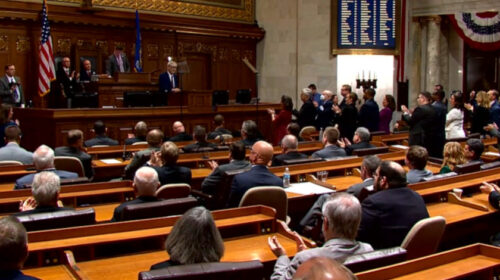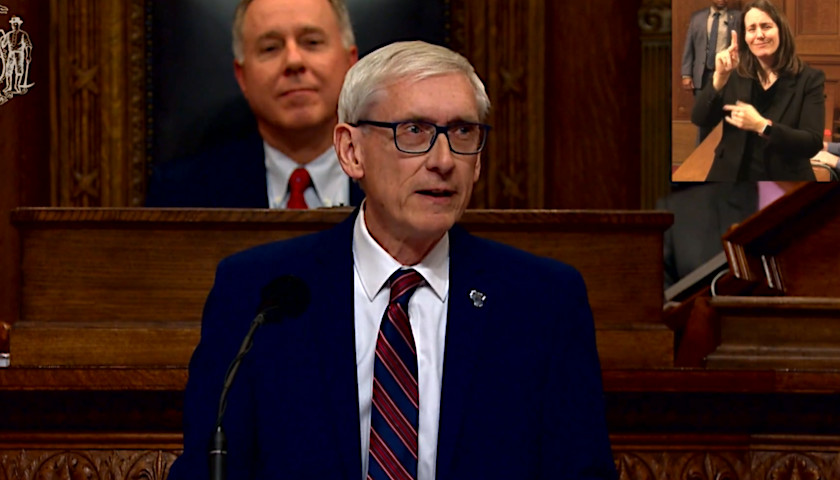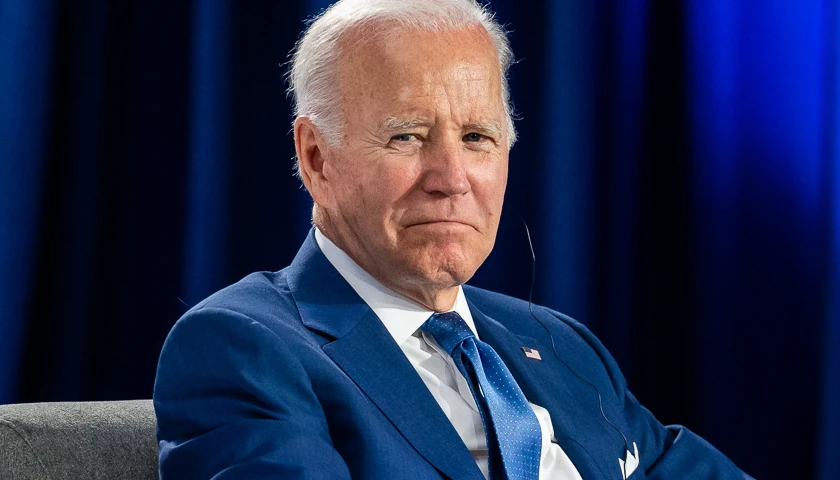In his fifth State of the State address Tuesday evening, Gov. Tony Evers began laying out how he plans to use Wisconsin’s $6.6 billion surplus, pitching a spending bender of big government initiatives already with a price tag to date of around $1.3 billion.
But there’s more to come. Evers is still constructing his biennial budget plan, set for release in a few weeks.
“In 175 years of statehood, our state has never been in a better fiscal condition than it is today,” Evers declared. He skipped over the fact that a Republican majority in the Legislature over the last dozen years has been chiefly responsible for the state’s healthy budget condition — and the $22 billion in tax relief accompanying it.
 The Democratic governor eschewed those conservative values, insisting that Wisconsinites battered by a pandemic deserve more “investments” from their government.
The Democratic governor eschewed those conservative values, insisting that Wisconsinites battered by a pandemic deserve more “investments” from their government.
“Wisconsinites have worked too hard and have gone through too much for us to return to austerity,” Evers said. “Now is the time to stay prudent, to save smart, and to be bold with reasonable investments to keep building a lasting legacy of prosperity.”
He then rattled off his list big-ticket initiatives.
› $500 million to expand mental health services, including $270 million in mental health programming for Wisconsin’s students. Evers declared 2023 “the year of mental health.”
› $100 million more for his costly and, critics say, punitive, PFAS (chemicals that break down slowly) remediation program.
› $340 million in child care assistance, a pandemic-era, federally funded program that Evers wants state taxpayers to pick up. It’s a cautionary tale about unfunded federal programs and mandates, and how liberals strive to keep them going with state tax dollars.
› $50 million for a nursing recruitment and retention program. There’s no doubt the health care workers were hit hard by the pandemic, but Evers’ dysfunctional Department of Safety and Professional Services hasn’t done health care professional any favors in a license crisis that has made applicants wait months for their credentials.
› $10 million more for a clean energy job training program. Expect the governor to put a lot more money into his climate change initiatives that an analysis from the Center for the American Experiment projects will prove very costly for Wisconsinites.
Evers insists his zero-carbon by 2050 plan will deliver savings while saving the planet.
“Our state now has a Clean Energy Plan with strategies to help lower energy bills for working families, reduce our reliance on out-of-state energy sources, invest in job training and apprenticeship programs in innovative industries and technologies, and create an estimated more than 40,000 jobs by 2030,” he said.
“Evers energy plan = double the energy tax and drive electric prices higher by importing California-style energy scarcity,” tweeted Scott Manley of Wisconsin Manufacturers & Commerce.
Evers energy plan = double the energy tax and drive electric prices higher by importing California-style energy scarcity https://t.co/v8HRd6C649
— Scott Manley (@ManleyWMC) January 25, 2023
Evers also introduced a plan to divert about a half billion dollars in state sales taxes (20%) to a shared revenue pot for Wisconsin’s local governments. Milwaukee and Madison, the cities that delivered the Democrat a second term in November, would most likely get the brunt of the money.
“At every turn, he finds new ways to spend the hard earned resources of Wisconsin taxpayers. It is the ‘Madison knows best’ mentality on steroids,” said state Sen. Duey Stroebel (R-Saukville).”
Evers said he’s open to cutting taxes, but not for the top 20 percent of income earners who are paying a good share of the state’s income taxes. For perspective, the top 20 percent of taxpayers paid 78 percent of federal income taxes in 2020, according to the Tax Policy Center. Evers’ plan is a 10 percent income tax cut or individuals earning $100,000 or less a year and married filers making $150,000 or less.
Republican leaders have proposed moving the state to a 3.25 percent flat income tax. Evers has said he does not support the tax reform proposal.
“When we deliver tax relief — and we will deliver tax relief — we’re going to do it responsibly by ensuring we can keep taxes low now and into the future, and we’ll do it without driving our state into debt or causing devastating cuts to priorities like public schools and public safety,” Evers said in his speech.
State Rep. Mark Born (R-Beaver Dam), co-chair of the Legislature’s powerful budget-writing committee, said Evers didn’t share the whole picture. The governor’s positive report left out the fact that nearly two-thirds of students in the state’s education system can’t read or solve a math problem at grade level. Evers has said he wants to pump a lot more money into public schools following record federal funding in recent years. Republicans say they aren’t hearing anything about accountability from the governor’s office.
“Additionally, families across the state continue to struggle with the economic pressures caused by inflation, Born said. “Republicans have prioritized returning tax dollars back to hardworking Wisconsinites, but there is more we can do to relieve the financial burden. Our state has a budget surplus—partially due to increased tax collections—and we need to return more of this money to taxpayers.”
Evers has clearly signaled that he plans to avail himself of the state’s record surplus in his upcoming budget proposal. His last budget plan, which Republicans mostly ignored, would have increased spending by around 10 percent.
The question is, will legislative conservatives hold the line?
“I do appreciate Evers’ newfound interest in mental health however, and his recognition that his mandatory school closings caused a literacy and mental health crisis. Unfortunately, it took him two years to notice the damage he inflicted on our school children,” State Sen. Van Wanggaard (R-Racine) said.
Watch Evers’ full remarks:
– – –
M.D. Kittle is the National Political Editor for The Star News Network.
Images “Gov Evers State of the State” by Gov. Tony Evers.





